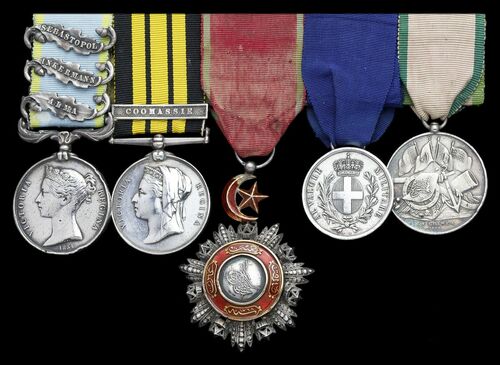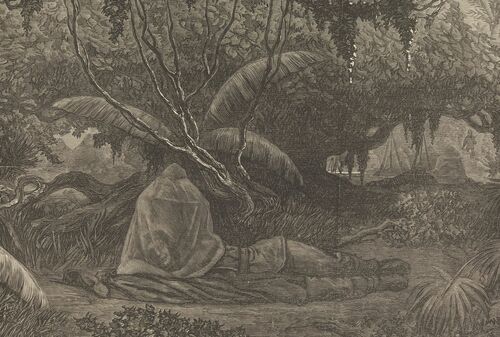Auction: 24002 - Orders, Decorations and Medals
Lot: 87
'In life the welfare of his Regiment was ever-present to Colonel Millett's mind, and among his last thoughts was his express desire that he should be carried to the grave by soldiers of the Regiment under his command.'
The Regimental Records of the Royal Welch Fusiliers shines light on the final moments of Colonel Millett
The outstanding campaign group of five awarded to Colonel S. C. Millett, 23rd Royal Welch Fusiliers, the inventor of the mosquito net whilst on campaign in West Africa
Millett was severely wounded, his left arm being shattered by gunshot, during the Assault on the Great Redan in September 1855 - and act which won the Regiment two V.C.'s - before going out to West Africa for the Ashantee campaign, when he was promoted for his fine services
Crimea 1854-56, 3 clasps, Alma, Inkermann, Sebastopol (Lieut. S. C. Millett. 23rd R. W. Fusiliers.), engraved naming; Ashantee 1873-74, 1 clasp, Coomassie (Lt. Col: S. C. Millett. 2nd Bn. 23rd Foot. 1873-4); Turkey, Ottoman Empire, Order of the Medjiedie, breast Badge, silver, gold and enamel; Sardinia, Al Valore Militare 1855-1856, silver (Captn. Sydney Crohan Millett 23rd Regt.); Turkish Crimea 1855, Sardinian die, signed 'J.B.', mounted as worn, very fine (5)
Turkish Order of the Medjidie London Gazette 5 March 1858.
Sardinian Al Valore:
'Served the Campaign of 1854 and 1855, the Battles of Alma and Inkermann, and the whole of the Siege of Sebastopol. Was severely wounded on the 8th September 1855, at the Assault on the Redan.'
Sydney Crohan Millett was born on 29 September 1836, the second child of Charles Millett (1792-1873) and Anne (neé Crohan, 1813-1899), who were married on 17 May 1834 at St George's, Hanover Square, London. Sydney was born at Bramdean House, Bramdean, Hampshire and was baptised on 12 December 1836 at the Bramdean Parish Church. He spent his youth in Highgate and was a pupil at the Cholmeley Grammar School before going up to Winchester College.
Crimean foray - first wound
Millett was made Ensign in June 1854 into the 23rd Royal Welch Fusiliers and went with his Regiment out to the Crimean War. During that campaign, he was promoted Lieutenant in September 1854 and Captain in November 1855, also being severely wounded by gunshot - which broke his left arm - and adding Turkish and Sardinian honours to his laurels. That action in which he was wounded would earn no less than two V.C.'s for the Regiment; it came at the cost of some 263 killed and wounded. Of the 18 officers who led their charge, 5 were killed and 9 wounded (Millett included).
Ashantee - inventor
Millett proceeded with the 2nd Battalion for the campaign in West Africa. The unit shared in the Battle of Amoaful on 31 January 1874 and were also involved in days of action between the field and Coomassie, with all those present being north of the Pra River maintaining the passage for the Columns. Millett himself was Second-in-Command of the 2nd Battalion and was called upon to Command the Support Column by Sir Garnet Wolseley, as recalled by The Times:
'On the 15th of January, a picked hundred of the 23rd Welsh Fusiliers under Colonel Mostyn started for the front and were in for the taking and burning of King Kofi's town. A week later, this party, esteemed so fortunate by their comrades, were followed by 200 more, commanded by Major Millett. These 200 Fusiliers only got within 30 miles of Coomassie, but performed the most important service of securing Sir Garnet Wolseley's communications at a critical time.'
The unit earned some 617 Medals, of which approximately 302 were clasped. Besides that, Millett also made an important contribution to the protection from the dreaded mosquito, which ravaged the troops in the bush, as recalled by the Illustrated London News:
'It included the head-curtain or veil attached to the Indian helmet of pith and canvas, to be used occasionally for protection against the mosquitoes, sand-flies, and other noxious insects of that country. This curtain, invented by Major Sydney Millett, of the 23rd [Royal Welsh] Fusiliers, consists of a gauze bag mounted on two light hoops of elastic steel, which may be either drawn up and rolled around the top of the helmet, like an Indian 'puggaree,' or may have its lower hoop let down, so as to cover the face and neck. It will be found a great comfort in sleeping at night, as shown in the illustration.'
He was duly rewarded with a Lieutenant-Colonelcy on 1 April 1874 for the fine work executed during the campaign. Together with Lieutenant Wilcox, he penned All at C, or The Captive, the Coffee, and the Cocoatina: an original modern musical melodrama on the way to the campaign. Married to Fanny Wells Ingram on 17 October 1876 at St Mary Abbotts, Kensington, London by the Reverend Alexander Colvin Blunt, Rector of Millbrook and Rural Dean of Southampton, Millett was made Colonel on 1 April 1879. He died - without issue - from the effects of sun-stroke on 3 August 1879 at the North Front Officers' Quarters at Gibraltar. Aged just 43 and whilst Commanding his Battalion, the Colonel had his final wish and was carried to his burial by his brother Fusiliers. He is further commemorated upon a memorial at Brompton Cemetery; sold together with copied research.
Subject to 20% VAT on Buyer’s Premium. For more information please view Terms and Conditions for Buyers.
Sold for
£4,800
Starting price
£1800







